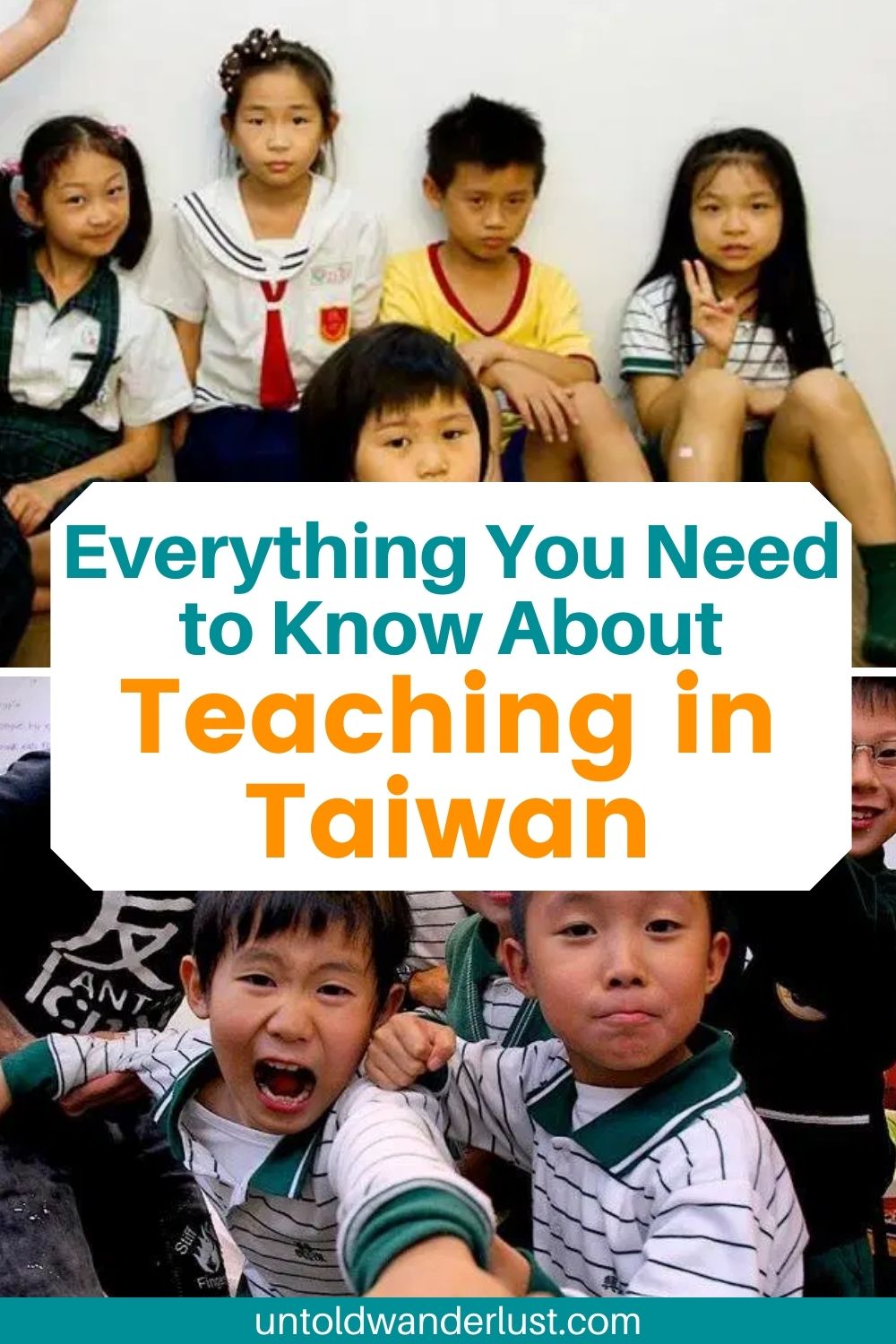Thinking of teaching in Taiwan? DON’T miss out on this essential guide by an ex-pat of 10 years. Find out what teaching & general life are like before you make the move.

Disclosure: Untold Wanderlust contains affiliate links. If you click on these links and make a purchase, we will earn a small commission at no extra cost to you. You can find our full disclosure policy and privacy policy here.
Nick Kembel is a Canadian who has been living and teaching in Taiwan since 2008. He met his wife Emily on the MRT in Taipei. They got married in 2011 and have two kids: Sage (5) and Lavender (3). Currently, his work mainly consists of writing work and blogging and he has published several books in Taiwan.
Country specifics
Which country are you teaching in/ have you taught in?
I’ve been teaching English in Taiwan for the last 10 years. My good friend from Canada and I were actually teaching in China before we moved to Taiwan. He was there for a year, but I was only there for a few months when we decided to make the move. We left China because we didn’t have proper working visas and China clamped down on that before the 2008 Beijing Olympics. At the time we were living in Shenzhen, just across the border from Hong Kong, where many teachers just hopped across the border once in a while instead of getting proper working visas. We chose to move to Taiwan because the people there also spoke Mandarin, the air pollution is not as bad as in China, and we had heard it was a very scenic country.
For the first five years in Taiwan, I taught full time, but after that, I married a Taiwanese person and got an APRC (permanent resident visa), I began transitioning from teaching to writing work and published my first book, Taiwan in the Eyes of a Foreigner, which is about living and travelling in Taiwan.
Even after transitioning, I still held on to some private teaching gigs because they paid well, but recently quit my last one to do writing work full-time. I write and edit a combination of educational content for Taiwanese publishers and travel content for magazines and my personal website.
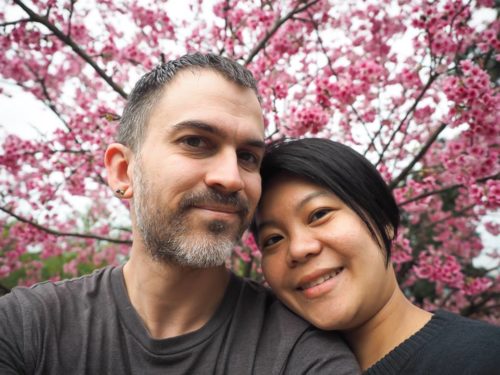
What TEFL certification do you need to teach in Taiwan?
You need a degree (in any subject) to teach English in Taiwan. I’ve heard of a few exceptions (usually people who have a two-year diploma + a teaching certificate), but having a degree is the norm.
An English teaching certificate is seldom required to get English teaching jobs, but it certainly doesn’t hurt, especially if you want to work in more professional institutions beyond the usual cram schools that most foreign English teachers work at. Some employers (for example, the British embassy in Taipei, which operates an English cram school) require specific courses, such as a CELTA.
What is the best thing about living in Taiwan?
Just to name a few: Taiwan is one of the safest countries in the world. Taiwanese people are exceptionally friendly and hospitable to foreigners (you’re treated like a rock star sometimes; at least half my foreign English teacher friends in Taiwan have appeared in the news or some kind of media in Taiwan at some point in their stay here). Taiwan is known as the “land of convenience” because the transportation system is phenomenal and there are convenience stores on literally every corner, where you can do everything from grabbing a cold beer or quick meal to paying your bills and booking train tickets. You can learn Mandarin, the most spoken language on Earth. Last but not least, Taiwan is a paradise for outdoor activity lovers.
Here’s my article on 50 things to do in Taiwan if you want to get a better idea of why Taiwan is such a great place to live!
In terms of teaching, most teachers in Taiwan don’t make quite as much money as those teaching in Japan or Korea, but the cost of living tends to be a bit lower (especially compared to Japan), so it is still possible to save quite a lot. The dress code for teaching in cram schools is quite casual; in summer you can even wear shorts and a T-shirt, so that may appeal to some. Overall, because Taiwan is such an easy place to live and a fun place to explore, it’s really common to meet ex-pats who have been here for 10+ years or settled here for life.

What is the worst thing about living in Taiwan?
To be honest, it’s hard to come up with much here…One thing to note about what I said above about being treated like a rock star is that they aren’t always fair about this. Generally, speaking, white people and especially white males get the most positive attention. Non-white foreigners, including foreigners of Taiwanese descent, may face more struggles to get the same job opportunities, and won’t receive the same level of special treatment.
Depending on where you’re from and what you’re used to, you may face some minor annoyances or culture shock in Taiwan; the traffic can be pretty terrible, some days are pretty smoggy, and noise pollution is a very real thing.
Is there a big ex-pat community? Is it easy to make friends?
Taiwan is a little different from other Asian countries such as Japan or Thailand where most foreigners are tourists. Many of the foreigners you see in Taiwan are actually living here, so locals usually assume you are here for teaching or studying rather than as a tourist.
About 700,000 foreigners are living in Taiwan (out of a total population of 23.5 million), but a significant percentage of those are Southeast Asian workers. Still, a good chunk of those is foreign English teachers. They are quite a varied lot, but certainly, there are little communities among them, depending on whether you are into the arts, music, sports, outdoor activities, partying, practising Mandarin, and so on.
I would say that overall, it is extremely easy to make friends. Not only are there loads of groups on Facebook for the above-mentioned interests, many of which have regular meet-ups or events, but also many locals can speak English and are keen to meet foreigners for friendship, dating, or practising a language. The latter is called “language exchange”, in which two people (or sometimes large groups of people) meet to take turns teaching each other their language, and often this kind of meet-up can be a pretence for making friends or dating.

When I first came to Taiwan with one of my best friends from Canada 10 years ago, we didn’t meet anybody for their first few months, so we went to a Couchsurfing event (it was bowling, followed by hot pot, followed by a reggae party) and met several people that we are still friends with today!
What is the cost of living in Taiwan?
This can vary hugely depending on where you are living (Taipei City is the most expensive, the suburbs are cheaper, and other parts of Taiwan can be significantly cheaper) and also your personal spending habits. I would say that the average foreign English teacher earns NT$60k (USD 2000) per month or slightly less in their first year, but you will have some initial set-up costs, so you probably won’t make anything in the first few months, and you’ll have some lower-income months (holidays, travelling, etc.)
Super, generally speaking, you could probably live on half or three-quarters of that, saving the rest, but I know plenty of people who don’t save a dime because they eat out, travel, or party a lot. It really comes down to personal choices; in Taipei, you can have a large meal in a hole-in-the-wall shop for US$2, and you can just as easily spend $40 at a medium-range place, or literally hundreds of dollars at a Michelin-star restaurant. Similarly, you can get a beer for $1 at 7-Eleven or for $10+ in a craft beer bar.
On average, most (but not all) things are noticeably cheaper than in Western countries but not quite as cheap as in some other Asian countries. It’s also very easy to spend a lot of money here if you aren’t careful.
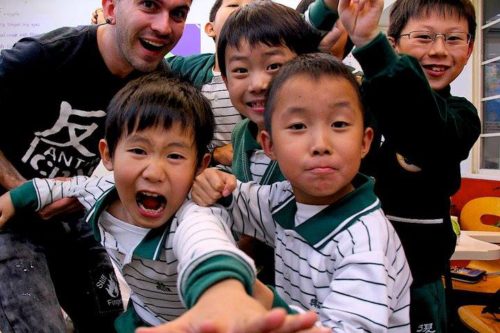
Moving abroad to Taiwan
How did you find your English teaching job in Taiwan?
A few weeks before coming, we went onto a local English job posting site, tealit.com; (this site is still used, but Facebook groups are now quite common too), saw a decent posting for a cram school in Taipei, and contacted the owner. She clocked us as the types that might be around for a while (which is ideal for a school; they have a high turnover rate and prefer teachers who will stick around), so she gave us an above-average offer and we agreed. I worked there for years, and my friend now manages the school.
A lot of teachers just show up in Taiwan and then try to find a job. Unlike countries such as Japan, where it would be too expensive to do that, you can get by like this (I would suggest having a few grand savings to rely on to get you through to your first paycheck), and most people find something within a few weeks to a month. It’s also possible to find jobs through agents before you arrive, but I would recommend against this, as it’s easier to know what you are signing up for once you are actually here, and many schools want you to actually be here and meet you before they will hire you. Job agents tend to be hired to pawn off the shittier jobs to newbies who haven’t even stepped foot in the country yet.
Once you start working and living in Taiwan, you will be offered jobs all the time. In 10 years, I have rarely had to apply for jobs, as they always come to me. Two of the highest-paying jobs I ever got in Taiwan were literally handed to me on the street (one in a tea shop and another in a bookstore). The people had no idea what kind of experience I had, and just approached me and asked if I wanted to start soon.
My students, or their parents, always want me to teach their friends, coworkers, and family members, and I often have to turn them down. To be fair, I’ve been here for a long time, have a lot of experience, and I’ve developed a name for myself by publishing books and so on, so you may not experience this right away, but most foreign teachers do experience this to some degree over time.
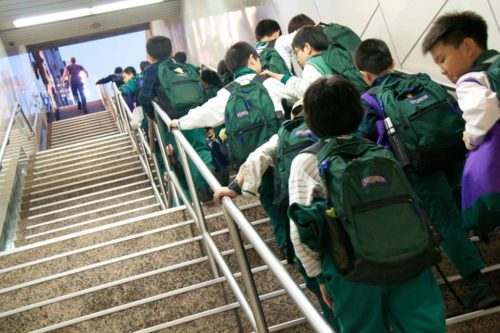
How did you find your accommodation?
We used the same website and looked at a few places before settling on a comfy apartment with a friendly South African married to a local Taiwanese as our landlord. We only paid about USD 500 per month for a small 2-bedroom apartment, but it was cheaper than average because we lived in the suburbs of Taipei (but still on the Taipei MRT line) rather than the city centre. If you live in the city centre, you could easily pay that amount or more per person, not for two people.
What did you do to prepare to move abroad?
I had been backpacking for years before I decided to move somewhat permanently abroad to teach. I had done a TEFL course in Bangkok a few years earlier. But actually, it was a breakup with a girlfriend at home that resulted in my rather spontaneous decision to actually move abroad. I had always kind of wanted to anyway, and what better way to heal after a breakup than to travel the world?
Did you get culture shock?
Because I had travelled extensively in Asia, there really wasn’t any shock for me at first. Taiwan is a developed country and the people are very polite. English is also commonly spoken. In many ways, it is easier for first-timers in Asia than many other countries would be.
However, as the years passed, I still found myself unable to fully get used to certain things. As I get older, I’m finding that the summers (which are extremely hot and humid) are getting even more difficult for me than before. I’ll never fully accept or get used to how much of a work-oriented culture it is, and after I had my kids, I found that certain little things started to annoy me more than they used to (for example cars not letting us cross the street even when we have a baby stroller).
In a sense, I don’t think a person can ever fully overcome culture shock. There are many stages of adaptation for sure, but some things about yourself and the cultural upbringing you can’t ever change.
In the classroom
Which grade(s) do you teach?
I’ve taught everything from two-year-olds to college students to company executives. Most English teachers in Taiwan teach in kindergartens or teach elementary-aged students in cram schools. I taught both of those for years but moved towards teaching business people 1-on-1 as I gained more experience and made the right connections.
On average how many students are in the class?
Most cram schools have about 8-20 kids in a class. Kindergartens can have more but you usually have a local teacher to help. I also taught in a college for a year, with 40-50 students per class.
Do you have a TA? Do you find your TA useful?
Only in kindergartens, and yes! I don’t particularly want to deal with kids who have peed their pants in the middle of a lesson.
What classroom materials and tools are available?
This varies a lot by school, but most cram schools I worked at provided textbooks and a minimal amount of classroom supplies. Generally, I had to plan my own classroom activities to supplement the materials in the books.
What is your favourite classroom game?
When I taught lower elementary-aged students, they could never enough of throwing sticky balls at the whiteboard. I liked playing really physical games (that still somehow included reviewing that day’s target English) because I often felt sorry that the kids had to be in school with their noses buried in books for so many hours per day. Oftentimes I was teaching seven-year-olds at 6 or 7 pm after they had already been at school since 8 am. I think they appreciated the excitement of getting out of their chairs and having some fun.
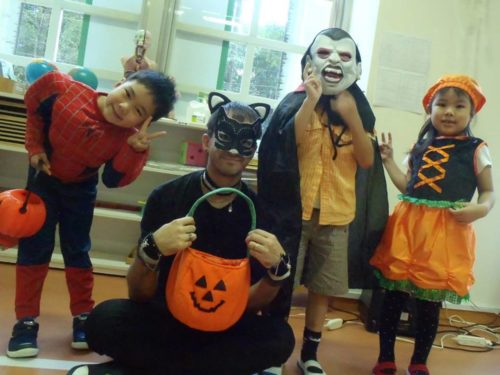
Do you have any funny experiences from teaching in Taiwan?
It’s been five years now since I taught kids…They said hilarious things every day, but it’s hard to remember specific examples. Some of the kids had really funny English names, like “Rambo” or “Panda.” Young kids would often call me “Dad.” Moving into teaching adults, I’ve regularly had businessmen (and businesswomen) show up for class and tell me that they are really drunk (business people are often pressured into drinking at meetings with clients).
A typical work week in Taiwan
What is your work week like? Days/ Hours
In my first five years, my evening cram school only offered about 15 teaching hours per week, so I filled that in by taking on a morning kindergarten job. It worked out to about 25 teaching hours per week, which is pretty normal, as you need lots of extra hours for planning and gaps between classes. If you teach 30 or more, you will quite busy and exhausted but can earn more (assuming you’re are working by the hour).
So, most weekdays would involve getting up early and teaching for a few hours, taking an extended lunch break at home, and then teaching in the evening until around 8 or 9 pm. I’ve never worked weekends, but it’s becoming increasingly common for schools to ask foreign English teachers to work Saturdays, and several of my long-term ex-pat friends work Saturdays and/or Sundays, choosing to have a few weekdays off instead, for better jobs or pay.
Some schools pay a monthly salary, but what often happens then is that the school ends up asking you to be there a lot more or take on extra tasks, and it means you can be making quite a bit less per hour. That’s why I’ve always stuck to gigs that pay hourly, and you can get more hours by taking on multiple part-time jobs and private teaching gigs. When you work hourly, the schools don’t usually expect much, just to show up and teach for your designated hours.
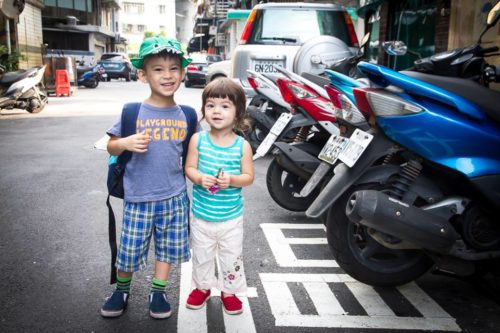
What do you like to do when you’re not teaching?
In my first five years in Taiwan, I did a lot of travelling around Taiwan on weekends, especially hiking and hitting the beach with friends, but I also did my fair share of drinking and partying. I’ve had kids for five years now so obviously my lifestyle is quite different than before, but I still travel a lot with my kids for my magazine and blog work.
Do you have any bad experiences teaching in Taiwan?
No, not really. I’ve worked for a couple of schools that weren’t managed well, but no horror stories or anything. In my second year in Taiwan, my apartment was robbed, and I lost my laptop and some hard drives containing years of photos. This was really unusual because Taiwan is an extremely safe country (the kind of place where you can leave a laptop in public for hours and nobody will take it), and I had literally just returned from a long backpacking trip to several countries in the Middle East and South Asia that are regarded as quite dangerous.
If you have a background in education, you may find yourself frustrated with the approach to education in Taiwan, especially in cram schools. These are businesses before anything else, and you may find their methods counterproductive. It’s less common for foreign English teachers, but if you find yourself teaching junior high or senior high school students, you be abhorred at the way they typically learn English in this country (it’s pretty much all rote memorization and very little actual speaking).
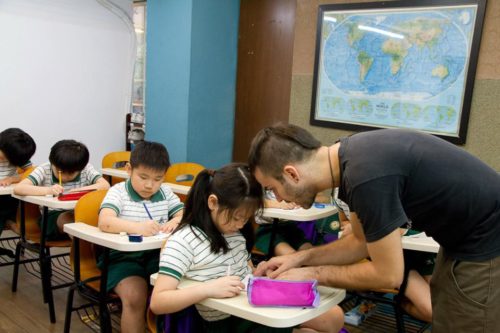
Personal experiences of teaching in Taiwan
What advice would you give to someone thinking about teaching English in Taiwan?
You might think a year sounds like a long time, but don’t be surprised if you end up staying for much longer! Things only get easier, and you start earning more money and making more friends, as you stay longer, so it is pretty common for people to stay for 2-3 years or longer.
Don’t let anyone convince you that Asian kids are shy and obedient! The kids can be pretty wild, and days can be quite exhausting. Basically, you are a performer, and cram schools may treat you like a kind of clown. Teaching is not easy, and it’s not for everyone.
Be aware that there is an unusual tax rule for foreign workers. If you stay in the country for less than 183 days in a tax year, you get taxed 20% and never get it back (versus the usual 5-7%, which you mostly get back). It doesn’t matter how many days you worked, just how many days physically in the country (don’t forget to deduct holidays abroad!). For example, if you show up in Taiwan in September at the start of the school year, you’ll have to hand over 20% of your total income from September to December! So make sure to come to Taiwan earlier, like in spring, and also stay for more than 183 days of the calendar year before you leave, even if your job finishes earlier!
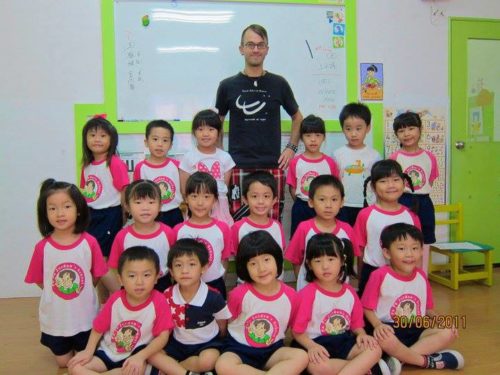
What is the most rewarding part of Teaching English in Taiwan?
As a teacher of children, having fun with them and watching them grow and improve was the best part. With adult students, it was gratifying to see them make real improvements in their lives (for example get promotions and make business deals) thanks to their English ability.
As I branched out into other types of work, the most rewarding part was the flexibility in my schedule and the sheer variety of types of jobs I do in a week; it’s never boring!
Are you still considering where to teach English? Click here to find out what it is like to teach in Spain.
Meet the guest blogger, Nick Kembel
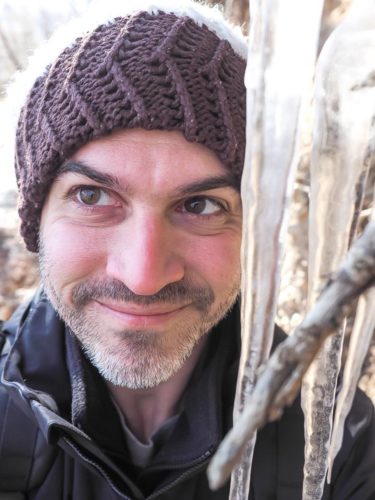
I’m 37 years old and I come from Edmonton, Canada. My wife is also a teacher and writer, and we do a lot of writing work for companies together. Despite living in Taiwan and living here for the last 10 years, we are actually moving to my hometown in Canada in September 2019. I’ve been encountering some success with my travel website in recent months and am planning to do travel blogging as a career when we make our big move.
Website/ Blog: Spiritual Travels
Social media: https://www.facebook.com/nickkembeltravel/
Like this post? pin it!
